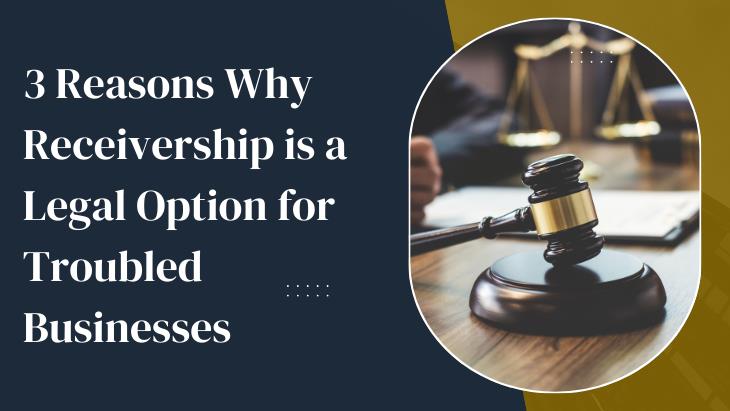Those who’ve been in business for long know that operating a company isn’t for the faint of heart. Markets shift, clients vanish, debts pile up, and sometimes—even with all the effort in the world—you find yourself staring down financial trouble. It’s stressful and can be exhausting. In moments like these, it’s easy to feel like your only choices are bankruptcy or closing shop entirely. However, you can still opt for receivership.
Receivership isn’t always talked about openly, yet it’s a legitimate legal tool that can help businesses stabilize, restructure, and, in many cases, survive. Talking with professionals dealing with Receivership Services can help you find an orderly way out. So, why would anyone consider it?
1. Protects Your Business From Spiraling Out of Control
When a business is in financial distress, you can’t have peace of mind. Creditors are demanding payments, suppliers are getting nervous, and customers may start doubting whether you’ll still be around next month. That’s a recipe for chaos. Receivership steps in to hit the pause button on some of that pressure.
The court appoints a receiver, an independent professional who takes control of the company’s assets, operations, and sometimes even its decision-making. At first, that might sound like you’re losing control of your own business—and in some ways, you are. But here’s the upside: instead of letting things spiral into messy lawsuits and unpaid debts, you have a neutral party managing things in a structured, transparent way. It takes the heat off you personally and shifts the focus to stabilizing the company.
2. Offers a Chance to Restructure and Recover
Sometimes you don’t want to close your business; you just want to fix it. You know the market, you’ve built relationships, and you’ve poured years of sweat into this thing. Why throw all of that away if there’s even a shot at turning it around? Receivership can help with that.
The receiver doesn’t just sit on your assets. In many cases, they actively work to reorganize the business. That might mean renegotiating contracts, streamlining operations, or finding new ways to make the company profitable again. Because they come in with a fresh perspective, they’re not weighed down by the emotional baggage you might feel. They can make tough decisions quickly—cutting unnecessary costs, focusing on core strengths, and sometimes even selling off parts of the business that no longer make sense.
3. Provides Fair Treatment for Creditors
If you’ve ever dealt with multiple creditors at once, you know how complicated and cutthroat it can get. Everyone wants to be paid first, everyone thinks their claim is the most important, and if left unchecked, that tension can lead to endless lawsuits and wasted money on legal fees. Receivership creates order out of that chaos.
When a receiver takes over, they’re responsible for treating creditors fairly. Instead of one aggressive creditor trying to grab all the assets while leaving the others with nothing, the receiver distributes funds and assets in a way that aligns with the law. This way, every creditor walks away happy.
And here’s the side benefit: when creditors know that a receiver is in charge, they tend to back off a bit. They recognize the system is in place to protect their interests, so they’ll have less reason to hound you.
Summing Up
When your business is in trouble, it’s easy to feel like you’re out of options. But receivership is one of those legal tools that doesn’t get talked about nearly enough. It can stabilize your situation, give you the chance to restructure, ensure fairness for creditors, and, if necessary, provide an orderly exit.
So if you’re staring at mounting debts and sleepless nights, don’t write off receivership as some obscure legal jargon. It might just be the very thing that helps you regain control.



